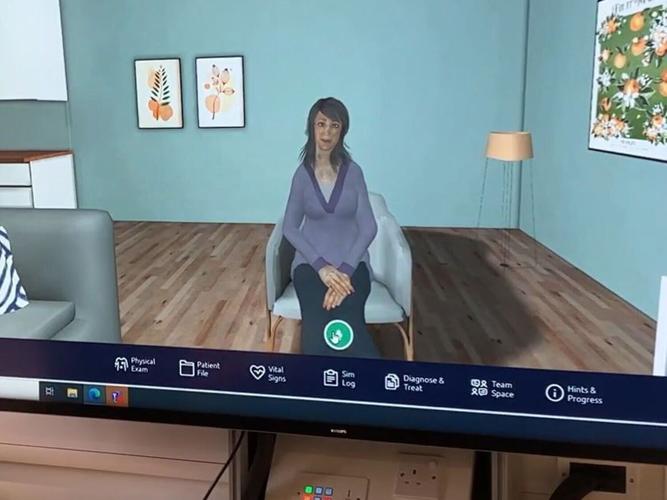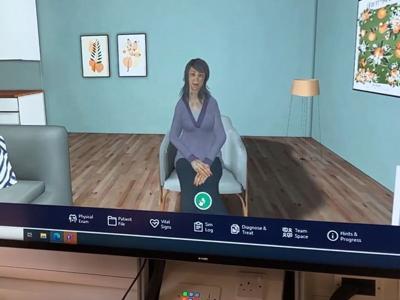
The AI patient, Sarah, responds to questions from students. (Coventry University via SWNS)
By Ed Chatterton via SWNS
University students will be trained how to become the next generation of NHS doctors and nurses - using virtual patients generated by artificial intelligence.
Undergraduates at Coventry University are being taught how to interact with an avatar created with AI tools to avoid "traumatizing or upsetting a real human".
The avatars are said to "behave like a patient" by giving individualized answers to specific questions - rather than just listing symptoms.
Researchers say because the software can generate many human conversations it can make virtual learning more realistic and effective than ever before.
The AI patient also "learns as it goes" which will lead to the creation of more sophisticated avatars for future healthcare workers to practice with and learn from.
PhD student Juliana Samson, from the university’s Research Centre for Healthcare and Communities, worked as a physiotherapist for 20 years.
She is leading the research alongside AI firm PCS to create the new large language model AI, which also cuts the time it takes to create a virtual patient.
Juliana said this will mean eventually people will be able to easily create their own customised situations using Artificial Intelligence.
She said: “Previously you would have to create folders and folders of every single question and answer that you might imagine happens in a conversation and link it all together – it was a really laborious process and wasn’t as fluent or adaptable.
"Now we're massively cutting the time that this needs in terms of the build and the responsiveness is off the scale.
“With this artificial intelligence we have been able to create an avatar that actually behaves like a patient and can be created quickly.
"It would previously have taken around 100 hours to create a virtual patient, but we did a 30-minute activity and the draft was miles better than before.
“The software has stepped up a level.

(Coventry University via SWNS)
"The AI can generate a lot of human conversations that you would need to have and students will be able to have conversations without traumatising or upsetting a real human, and if you get it wrong you can go again.”
Juliana is working with students and professionals in healthcare and technology alongside her research with Coventry University’s Research Centre for Postdigital Cultures.
Several healthcare disciplines are already involved, spanning from paramedics, physios to social work.
But there are plans for it to also be used by doctors, nurses, diagnostic radiographers, dietetics, occupational therapy and operating department practitioners.
The conversations with the avatars sees students given points for asking pertinent questions on different subjects.
They can also read the entire conversation back afterwards to look at what went well and what they could improve.

(Coventry University via SWNS)
Students can also practice taking a patient’s history during a clinical conversation at an earlier stage in their career as this would not usually happen until on placement.
Balazs Moldovanyi, CEO of PCS, said: “We are thrilled to provide Coventry University our most intelligent Spark virtual patient AI, now driven by an in-house trained generative large language model for never-before-seen realism in communication training.
"We are excited to see how far the university's domain experts can take this AI with their custom scenarios."
Michelle Castleberry, co-founder of PCS, said: “Collaborating with Juliana is a dynamic experience and her enthusiasm and mission-driven mindset infuse every meeting with purpose and energy.
"She adeptly learns the more technical aspects of our technology while educating our team on the necessary clinical components of the project.
“I feel privileged to be a part of this collaboration and together we’ve synergized our strengths to achieve ambitious milestones over the past 20 months while staying true to our shared goal of making a positive impact in Interprofessional Education (IPE) using AI-driven simulations."























(0) comments
Welcome to the discussion.
Log In
Keep it clean. Please avoid obscene, vulgar, lewd, racist or sexual language.
PLEASE TURN OFF YOUR CAPS LOCK.
Don't threaten. Threats of harming another person will not be tolerated.
Be truthful. Don't knowingly lie about anyone or anything.
Be nice. No racism, sexism or any sort of -ism that is degrading to another person.
Be proactive. Use the "Report" link on each comment to let us know of abusive posts.
Share with us. We'd love to hear eyewitness accounts, the history behind an article.